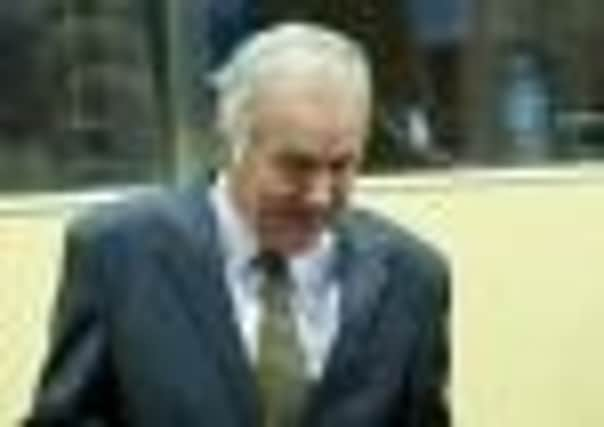Ratko Mladic in throat-slit gesture to survivor


Weakened by strokes, the frail 70-year-old drew his finger across his throat and stared directly at a survivor of the Srebrenica massacre sitting in the packed public gallery in an angry exchange of hand signals through the bulletproof glass that separated them.
“Not even an animal would behave like that,” said Mevlija Malic as she watched the trial on television in Bosnia.
Advertisement
Hide AdAdvertisement
Hide AdMladic is accused of commanding Bosnian Serb troops who opened the war with a campaign of murder and persecution to drive Muslims and Croats out of territory they considered part of Serbia.
His troops rained shells and bullets down on civilians in the 44-month-long siege of the Bosnian capital, Sarajevo. They also butchered 8,000 Muslim men and boys in Srebrenica in July 1995, Europe’s worst massacre since the Second World War. “The world watched in disbelief that in neighbourhoods and villages within Europe a genocide appeared to be in progress,” prosecutor Dermot Groome said at the UN court in The Hague.
Twenty years after the war that left 100,000 dead, Bosnia remains divided into two mini-states – one for Serbs, the other shared by Bosnian Muslims and Croats – linked by a central government.
Mladic fled into hiding after the war and spent 15 years as a fugitive before international pressure on Serbia led to his arrest last year.
In another court in The Hague yesterday, former Liberian president Charles Taylor faced a sentencing hearing after being convicted last month of aiding rebels in neighbouring Sierra Leone’s civil war.
Prosecutor Mr Groome told the three-judge panel that Mladic was hand-picked by Bosnian Serb leader Radovan Karadzic because of his skills as a military commander but also “because Karadzic believed he was willing to commit the crimes needed to achieve the strategic goals of the Bosnian Serb leadership”.
Mr Groome signalled that prosecutors would use Mladic’s own words against him in the trial, drawing on a stash of wartime diaries Mladic kept, radio intercepts and appearances he made on TV during the war. “(Mladic) held Sarajevo in the palm of his hand,” Mr Groome said, playing an intercepted radio communication of Mladic ordering the shelling of part of the city and a video of civilians scurrying across devastated streets to avoid sniper fire during Sarajevo’s siege. Mr Groome said all the attacks were part of an “overarching” plan hatched by Karadzic and former Yugoslav president Slobodan Milosevic to ethnically cleanse large parts of Bosnia of non-Serbs and carve out a “Greater Serbia”, from the ruins of the former Yugoslavia.
Karadzic is also on trial at the tribunal following his 2008 arrest. Milosevic was put on trial here, too, for fomenting wars across the Balkans, but he died of a heart attack in 2006 before judges could deliver their verdict.
Advertisement
Hide AdAdvertisement
Hide AdProsecutors say they will use evidence against Mladic from more than 400 witnesses, though very few of them will testify in court. Much of their evidence has already been heard in other cases and will be admitted as written statements.
The first witness is to start testifying on 29 May, but Presiding Judge Alphons Orie of the Netherlands hinted that he may postpone the case because prosecutors have not disclosed all evidence to Mladic’s defence. Bosnia’s president hailed the trial’s opening as a historic day in the still bitterly divided country’s recovery from its war wounds.
“First of all we are expecting from this trial the truth,” said Bakir Izetbegovic. “The truth and then justice for the victims, for the families of the victims. It is the worst period of our history.”
Mladic gave a thumbs-up and clapped towards the public gallery as the trial got under way.